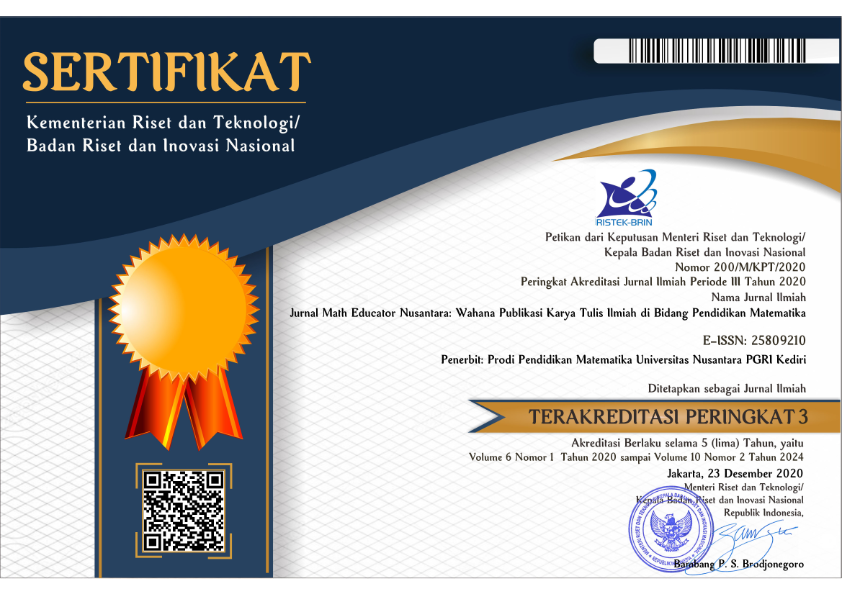The influence of discovery learning learning model using STEAM approach (science, technology, engineering, art, mathematics) against students' computational thinking ability
DOI:
https://doi.org/10.29407/jmen.v9i1.19391Keywords:
Discovery Learning Mode, STEAM Approach, Computational ThinkingAbstract
The purpose of this study was to determine the effect of the Discovery Learning learning model using the steam approach (science, technology, engineering, art, mathematics) on students' computational thinking abilities. This type of research is quantitative research with experimental research methods. The population in this study were class VIII SMP A. Wahid Hasyim Tebuireng with a sample of class VIII-I as the experimental class and class VIII-C as the control class. The experimental group was treated using the Discovery Learning model with the STEAM approach while the control group used the conventional model. The instrument used is a test sheet. Data analysis techniques using the t test. Based on the results of the analysis of the data obtained by calculating using IBM SPSS25 between the samples that were given the treatment of the Discovery Learning learning model with the STEAM approach in the experimental class and the control class, the output results were Sig. (2-tailed) of 0.020. This means that the sig value of 0.046 <0.05 means H0 is rejected, so it is said that there are differences in students' computational thinking abilities between those who take the Discovery Learning model learning the STEAM approach and those who take conventional learning. Then there is the influence of the STEAM approach Discovery Learning model on students' computational thinking skills.
References
Aunurrahman. (2019). Belajar dan Pembelajaran. Bandung: Alfabeta.
Cahdriyana, R. A., & Richardo, R. (2020). Berpikir komputasi dalam pembelajaran matematika. LITERASI (Jurnal Ilmu Pendidikan), 11(1), 50-56.
Emma, S. (2021). Studi Meta Analisis Pendekatan Science, Technology, Engineering, Art and Mathematics (STEAM) (Doctoral dissertation, UIN Raden Intan Lampung).
Fi’liyah, R. (2019). Pengaruh Model Discovery Learning Terhadap Kemampuan Berpikir Tingkat Tinggi Siswa Di Mi Sabilil Khoir Porong-Sidoarjo (Doctoral dissertation, Universitas Islam Negeri Maulana Malik Ibrahim).
Hadinugrahaningsih, T., RahmawatI, Y., Ridwan, A., Budiningsih, A., Suryani, E., Nurlitiani, A., & Fatimah, C. (2017). Keterampilan abad 21 dan STEAM (Science, Technology, Engineering, Art, and Mathematics) project dalam pembelajaran kimia. LPPM Universitas Negeri Jakarta, 1-110.
Hamdani. (2011). Strategi Belajar Mengajar. Bandung: Pustaka Setia.
Harahap, M. S., Nasution, F. H., & Nasution, N. F. (2021). Efektivitas Pendekatan Pembelajaran Science Technology Engineering Art Mathematic (Steam) Terhadap Kemampuan Komunikasi Matematis. AKSIOMA: Jurnal Program Studi Pendidikan Matematika, 10(2), 1053-1062.
Ikmal, M. (2022). Pendekatan Science, Technology, Engineering, Art And Mathematics (Steam) Terhadap Kemampuan Berpikir Kreatif Siswa: Studi Meta Analisis (Doctoral Dissertation, UIN Raden Intan Lampung).
Indah, S. C. (2015). Pengaruh Model Pembelajaran Discovery Learning Terhadap Keaktifan Dan Hasil Belajar Matematika Siswa Kelas Viii Mtsn Karangrejo. Skripsi (Institut Agama Islam Negeri Tulungagung).
Kosasih. (2014). Strategi Belajar dan Pembelajaran Implementasi Kurikulum 2013. Bandung
Kurniasih, I., & Sani, B. (2014). Perancangan Pembelajaran Prosedur Pembuatan RPP yang Sesuai Dengan Kurikulum 2013. Jakarta: Kata Pena.
Mubarok, C. (2014). Penerapan Model Pembelajaran Discovery Learing Terhadap Hasil Belajar Siswa Kelas X Di SMK Negeri 2 Surabaya Tahun Pembelajaran 2013/2014. Jurnal Pendidikan Teknik Elektro 2 (1): 215-221
Muhtadi, A. (2019). Pembelajaran Inovatif. Jakarta
Nasrah, N. (2021). Efektivitas Model Pembelajaran Steam (Science, Technology, Engineering, Art, And Mathematics) Pada Siswa Kelas IV SD. JKPD (Jurnal Kajian Pendidikan Dasar), 6(1), 1-13.
Nasution, M. K. (2017). Penggunaan metode pembelajaran dalam peningkatan hasil belajar siswa. STUDIA DIDAKTIKA: Jurnal Ilmiah Bidang Pendidikan, 11(1), 9–16.
Nurdin, S.; Adriantoni. 2016. Kurikulum dan Pembelajaran. Depok: PT Rajagrafindo Persada
Nurhikmayati, I. (2019). Implementasi STEAM Dalam Pembelajaran Matematika. Didactical Mathematics, 1(2), 41–50.
Oktaviani, V. A., Lyesmaya, D., & Maula, L. H. (2020). Meningkatkan Pemahaman Konsep Matematika Menggunakan Pendekatan STEAM (Science, Technology, Engineering, Arts dan Mathematics) berbasis Daring. Jurnal Kajian Pendidikan Dasar, 5(2), 139–149.
Purwandari, I., Ekawati, W., & Tristanti, L. B. (2020). Penerapan Model Pembelajaran Problem Based Learning Dengan Media Komat Terhadap Pemecahan Masalah Dan Kecemasan Matematika Siswa. Jurnal THEOREMS (The Original Research of Mathematics), 5(1), 1-12.
Rahmawati, H. (2022). Pengaruh Model Pembelajaran Blended Learning Menggunakan Pendekatan Science, Technology, Engineering, Art, And Mathematics (Steam) Terhadap Kemampuan Berpikir Kreatif Peserta Didik (Doctoral Dissertation, Uin Raden Intan Lampung).
Redhana, I. W. (2010). Pengaruh Model Pembelajaran Berbasis Peta Argumen Terhadap Keterampilan Berpikir Kritis Siswa Pada Topik Laju Reaksi. Jurnal Pendidikan Dan Pengajaran, 43(2).
Sahih, A. (2015). A Practice-based Model of STEAM Teaching STEAM Students on the Stage (SOS) TM. Rotterdam: Sense Publishers.
Sugiyono. (2013). Metode Penelitian Pendidikan Pendekatan Kuantitatif, Kualitatif, dan R&D. Bandung: Alfabet.
Suriyah, P., & Noeruddin, A. (2019). Efektivitas guided discovery learning dengan involving students in self and peer evaluation terhadap hasil belajar mahasiswa pada mata kuliah matematika diskrit. Jurnal Math Educator Nusantara: Wahana Publikasi Karya Tulis Ilmiah Di Bidang Pendidikan Matematika, 5(2), 101-108. https://doi.org/10.29407/jmen.v5i2.13515
Tristanti, L. B., & Iffah, J. D. N. (2022). Pengembangan Media Pembelajaran Geometri Ruang Berbasis Android Berbantuan Smart Apps Creator Dalam Meningkatkan Kemampuan Pembuktian. AKSIOMA: Jurnal Program Studi Pendidikan Matematika, 11(3), 1716-1728.
Tristanti, L. B., Akbar, S., & Rahayu, W. A. (2021). Pengaruh Media Pembelajaran Game Edukasi Berbasis Construct terhadap Kemampuan Pemecahan Masalah dan Hasil Belajar Siswa. Mosharafa: Jurnal Pendidikan Matematika, Volume 10, Nomor 1, Januari 2021
Tristanti, L. B., Ernawati, W., & Hidayati, W. S. (2021). Penerapan Video Media Pembelajaran Penjumlahan Bilangan Bulat. Mosharafa: Jurnal Pendidikan Matematika, 10(3), 413-424.
Wahyuni, A.P., Abbas A.B., & Kukuh. (2018), Pengaruh Model Pembelajaran Discovery Learning Terhadap Hasil Belajar Matematika Siswa Pada Materi Bangun Ruang Sisi Datar. Primatika: Jurnal Pendidikan Matematika, 7 (2), 115 -122
Downloads
Published
Issue
Section
License
Authors who publish with this journal agree to the following terms:
- Copyright on any article is retained by the author(s).
- The author grants the journal, the right of first publication with the work simultaneously licensed under a Creative Commons Attribution License that allows others to share the work with an acknowledgment of the work’s authorship and initial publication in this journal.
- Authors are able to enter into separate, additional contractual arrangements for the non-exclusive distribution of the journal’s published version of the work (e.g., post it to an institutional repository or publish it in a book), with an acknowledgment of its initial publication in this journal.
- Authors are permitted and encouraged to post their work online (e.g., in institutional repositories or on their website) prior to and during the submission process, as it can lead to productive exchanges, as well as earlier and greater citation of published work.
- The article and any associated published material is distributed under the Creative Commons Attribution-ShareAlike 4.0 International License















